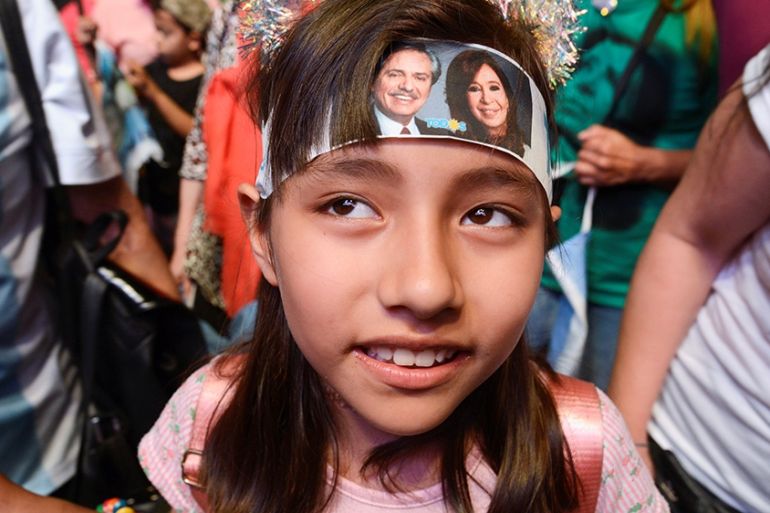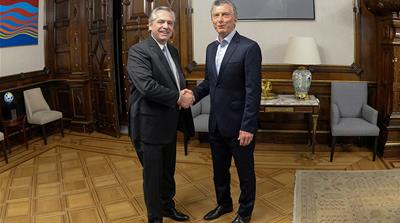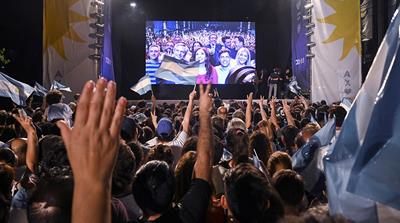After Fernandez victory, what is next for Argentina’s economy?
President-elect inherits an economy that has ravaged livelihoods and left the country teetering on the edge of default.

Transitions of presidential power are always delicate – even more so when a country is in the throes of an economic crisis.
Argentina‘s changing of the guard got under way on Monday with a closed-door breakfast meeting in the presidential palace between centre-left, Peronist President-elect Alberto Fernandez and outgoing, market-friendly President Mauricio Macri.
Keep reading
list of 3 itemsFacing economic crisis, Argentina picks Fernandez as president
How Argentina’s economic crisis is hurting women more than men
The meeting, captured by a photo of the two shaking hands and smiling, conveyed the message of an orderly and cordial atmosphere following the bitterly fought campaign.
On Sunday, voters delivered a stunning rebuke of the austerity measures implemented under Macri, awarding Fernandez and his running mate – former populist President Cristina Fernandez de Kirchner – 48 percent of the vote compared with 40 percent for the incumbent.
The weeks ahead promise to bring a flurry of meetings and negotiations as Fernandez assembles his economic team and drafts policies to revive the country’s fortunes and bring relief to millions of struggling low- and middle-income Argentines.

A daunting task
The Argentine peso strengthened on Monday, but on the streets of Buenos Aires, an overall sense of uncertainty is palpable. Shuttered businesses – casualties of the country’s latest downward economic spiral – have become a common feature.
The president-elect faces the daunting task of reviving a contracting economy, reducing poverty, and negotiating breathing room with international creditors circling to see if Latin America’s third-largest economy will default on its debt obligations yet again.
“The first thing that is necessary is that the new government has to come up with a solid economic plan,” Gabriel Rubinstein, director of Gabriel Rubinstein and Associates, told Al Jazeera.
Fernandez is not scheduled to take office until December 10th, but for many Argentines, relief from compounding economic hardships cannot come fast enough.
Poverty has soared under Macri’s administration, unemployment is at 10.6 percent, inflation is on track to be 55 percent this year and the country’s $57bn line of credit with the International Monetary Fund (IMF) has been suspended pending renegotiations – a task that now falls to Fernandez’s incoming administration.
The Argentine peso and other assets were hammered after Fernandez won a landslide victory in the August presidential primaries, and the country’s foreign-exchange reserves have fallen at an alarming rate since then – dropping by some $22bn, Guido Sandleris, the president of the Central Bank of Argentina, told reporters on Monday.
One-third of that amount was used to shore up the Argentine peso, another third was drained by people seeking to shelter their depreciating local earnings by purchasing dollars, and the final third was used to service debt obligations.
Argentina has $43bn left in its reserves, Sandleris said.
After Fernandez clinched the presidency on Sunday, the country’s central bank tightened currency controls, limiting dollar purchases by individuals to just $200 a month.
The measures are intended to “protect international reserves, and give the new government more freedom to be able to implement its economic policies,” Sandleris said.
“It’s not normal for a presidential election to generate the level of uncertainty and volatility that we have seen in these months. This doesn’t happen in other countries,” Sandleris noted. “Unfortunately, Argentines have not been able to build a basic consensus [around economic policy] that would protect us against the uncertainty that a new government may bring.”

Broad outlines
Fernandez has only offered broad outlines of his economic policy goals, which include taming inflation, boosting wages and benefits and renegotiating the terms of the country’s IMF bailout deal.
“You have an opportunity in 2020 to improve the economy substantially and cut back on inflation, to 20 or 25 percent,” said Rubinstein, who formerly served as a governor with Argentina’s central bank.
The formula would translate into a slight increase in salaries in real terms, but not to the degree that would make up for the dramatic drop in purchasing power amid runaway inflation, Rubinstein said, warning that any path towards growth will require shrewdness on the part of the government, and patience on the part of voters.
“If people are expecting to recover everything that was lost in these last two years, well then we’re in a really bad spot, because that will trigger a spiral of salaries and prices,” he said. “You won’t bring inflation down, and things will get complicated for the dollar.”
Ramiro Albrieu, an economist with the Center for the Study of State and Society in Buenos Aires, told Al Jazeera that relief for ordinary Argentines is far from imminent.
“A lot of people are expecting a change, but in reality what we’re going to see is stagnation. At least in the first trimester, there isn’t going to be a lot of good news,” said Albrieu.
The incoming Fernandez government can adopt measures that are focused on helping people who are struggling the most, said Albrieu, such as boosting financial assistance for low-income families with children, or minimising price increases for the poorest segment of society. The key, he says, is to draft a three- or four-year “consistent plan” that builds up Argentina’s credibility among international lenders, and promises salary growth further down the line.
“If it was me, I would come up with a plan that isn’t about a fiscal tightening,” said Albrieu. “We already did that, and honestly, socially and politically, the country doesn’t have any margin to work with.”
Albrieu and Rubinstein support capital controls that Argentina’s central bank introduced in the immediate wake of the presidential election, though they say the bank could have implemented them earlier, or done so more gradually. Rubinstein says the timing of the capital controls could have been motivated by a desire not to anger Macri’s base of voters ahead of the election.
Beyond the private lenders, Fernandez has said he intends to renegotiate the terms of an unpopular $57bn bailout package struck by Macri with the IMF. Kristalina Georgieva, the head of the IMF, congratulated Fernandez on his victory on Monday, saying that she hoped to work together to confront Argentina’s economic challenges and promote sustainable growth for its citizens.
“Hopefully the IMF takes a constructive position,” said Rubinstein, noting that the international lender has its own interests. “You don’t know if when the IMF makes a recommendation, it’s because it is absolutely convinced that is the best for Argentina, or it’s the best way for the fund to get its money back.”